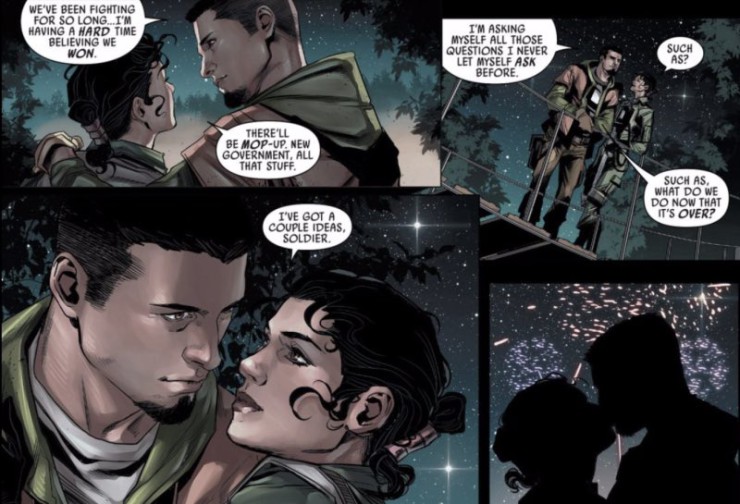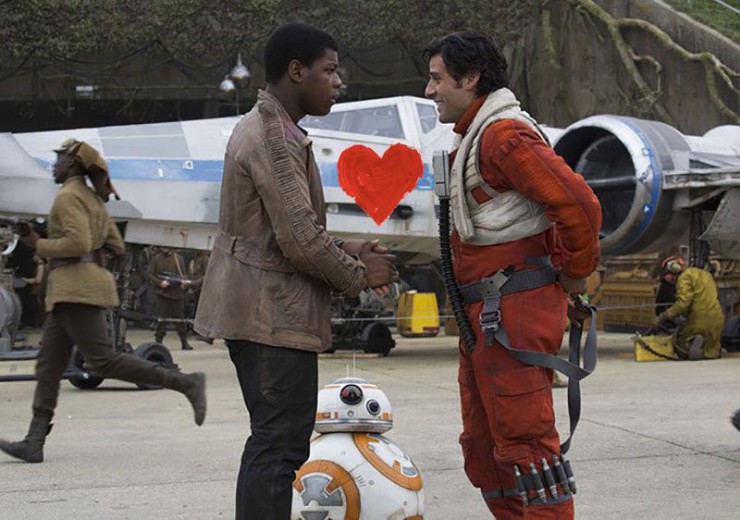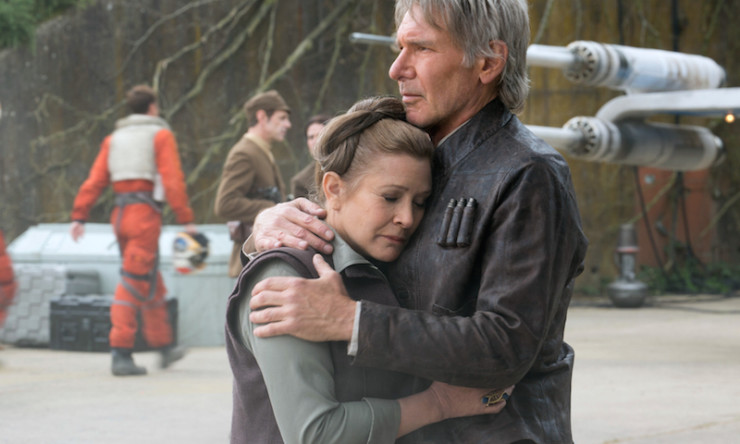Force-ghosts jumping from Imperial warships into apprentices’ bodies. Assassins falling in love with the Jedi they’re programmed to kill. Hapan queens trading one-night-stands for heirs. Reptilian crime lords spraying unsuspecting princesses with pheromones to broker a (eyebrow wiggle) trade. Jedi/Yuuzhan Vong hybrids caught between dead best friends/unrequited loves and their new, fallen-to-the-dark-side masters. Love—or, at least, sex and sometimes romance—in the Star Wars universe used to be a hot mess.
But what I grew up with as the Expanded Universe has now been mostly struck from the record—or, rather, redefined as “Star Wars Legends,” with an entirely new canon built around The Force Awakens. The introduction of new characters, through adventures in tie-in novels and comics as well as the new big-screen trilogy, brings new romantic dramas. And the surprising thing is, they’re all a lot more stable.
Spoilers for The Force Awakens.
Well, except for Han and Leia.
Happily Ever After Not Guaranteed
In the Legends books written in the 1990s and 2000s, the princess and the smuggler, who sparked so well in the original trilogy, made it to their Happily Ever After (or HEA, as the romance genre calls it) with fairly smooth sailing. Sure, Han did kidnap Leia to Dathomir to convince her to marry him, and their kids got snatched by dark side users more than once.
With the new continuity, we get a different story entirely—and while we haven’t gotten the exact timeline, here’s the current headcanon: Han and Leia settled into domestic bliss, but somewhere along the way things broke down. Maybe they sent Ben to Uncle Luke’s Jedi training school when he was far too young. Perhaps part of his experimentation with the dark side and getting to know his grandfather was because both of his parents either didn’t pay enough attention to him or didn’t tell him enough about his heritage. At any rate, Ben became Kylo Ren, and Han and Leia’s marriage couldn’t weather the death and betrayal left in his wake.
But what happened, when we started The Force Awakens and realized that they had not been in each other’s lives for years, was that we got a more interesting story. Nothing that we were promised at the end of Return of the Jedi has come to pass: The Empire hasn’t disappeared, Luke hasn’t resurrected the Jedi Order, Han and Leia haven’t settled into a lifetime of trading “I love you”/”I know”s. But who’s to say they ever had a chance? All we ever saw was them taking turns rescuing each other, fighting in Rebel bases, and macking on the Falcon—all high-pressure scenarios, nothing that’s any sort of foundation.
The past few years have seen the romance genre grapple with a sea change: Fewer authors feel beholden to the HEA, opting instead for more realistic endings where the couple can’t make it work, or where they get each other but lose something else. Writing for Ravishly, Noah Berlatsky emphasizes what’s most important about a romance novel, the optimism:
…I prefer to leave the door open for unhappy endings in my romance novels for some of the same reasons I like and admire and respond to the happily ever after when it comes. The thing I love about romance novels is the way they insist that love and happiness are important and real and true. You can show that insistence by defiantly giving your audience the happy ending. But you can also do it by acknowledging that some stories don’t end that way, while still honoring the impulse to believe that they should.
Similarly, in a discussion on All About Romance, author Jennifer Crusie explains why romance novels should provide the reader with a sense of catharsis, even if the ending is “just” instead of “happy”:
But a “just” ending can also mean a “sadder but wiser” ending (like Scarlett O’Hara’s) or a noble sacrifice ending (like the one in movie Sommersby) or a “pick-up-the-pieces-and-go-on” ending in which it’s clear the characters will not have perfect, easy lives thereafter, but are better off because of the struggles they’ve won and the life lessons they’ve learned.
So if HEA means a perfect marriage with perfect children in the offing, no, absolutely not, the romance doesn’t require this. But if HEA means all the pressing problems solved with hope for the future and a feeling of personal achievement and of justice served for both the characters and the reader, then, yes.
To the same end, Sarah MacLean, one of the romance genre’s wittiest authors (and one of the writers who convinced me to take the genre seriously), recently wrote a piece for Panels about how, for all of his swagger and dramatic heroics, Han Solo is not a romantic hero:
To be a real romantic hero, he has to change. He can change however he likes, but it helps if it’s because of love. But the reality is this: He never changes. He leaves her and only returns because he is kind of shamed into it. Because he knows he did wrong. He’s ashamed of himself. And he knows he can’t really live up to his ONE JOB, which is being Leia’s partner in all this horrible stuff. And then […] when he finally returns and they finally talk about losing their child, he says what is possibly the worst thing ever. “He just had too much Vader in him.”
[…] This isn’t a tragic love story because he dies. This is a tragic love story because Leia would have been better off with just about anyone else as a husband instead of this narcissistic, self-loathing man-child who can’t get out of his head enough to realize that his wife and the mother of his child might need him at one of the worst times of her life, and that… oh, hey, the world is ending and it’s not about him. I mean. Please. Sure, he’ll fly into a giant Death Star with every intention of not coming back alive, but fancy explosions will never ever make me forget that when shit got real, like really, emotionally, no-holds-barred-real… Han beat the hell out of dodge.
So far, the new Star Wars trilogy is all about the new generation finishing what Han, Leia, and Luke started—doing it again but doing it better—and as we see in The Force Awakens, that may include romance…
Love is Love
We knew that Poe Dameron was going to be a hunky X-Wing pilot. We knew that Finn would be an adorable stormtrooper-turned-hero. What we never anticipated was how much chemistry Oscar Isaac and John Boyega would have, nor how many little moments in The Force Awakens would seem to support Finn/Poe as certainly a fan ’ship and possibly even an official pairing. The lip biting and gripping each other and running into each other’s arms seems too deliberate, as if the writers were trying to tell us something without saying it outright.
Fandom christened them Stormpilot, with Tumblr and Archive of Our Own collecting a staggering amount of artwork, GIFs, fanfiction, and fan videos (and songs! listen to “It Suits You”) exploring every nook and cranny of this imagined relationship. You even have a straight-faced Isaac saying things like (on The Ellen DeGeneres Show) “Well, I was playing it as romance” (although if you watch the entire video, he doesn’t actually say who he was playing romance to):
Let’s level for a second. Most likely, Stormpilot will never be a reality outside of fandom. If franchise owners are afraid of putting one girl in the package, you can bet they won’t market (gasp) gay characters. (There has been plenty of fan speculation that Poe is bisexual or pansexual. However, I believe that if an onscreen Star Wars character is going to be explicitly not heterosexual, the screenwriters would have that person be gay or lesbian, to prevent confusion for people who don’t understand the queer community.) However, the gift that Finn/Poe has given us is the sheer ability to imagine this, the mere thought that this could happen.
The new books have a little more leeway in introducing queer characters. Lords of the Sith introduced us to Moff Delian Mors, an Imperial officer who loses her wife in an accident; Star Wars: Aftermath features Imperial turncoat Sinjir Rath Velus, who is interested only in men. But neither is perfect: One’s spouse is fridged, while the other must fight off the advances of a woman. So, Finn/Poe is still the closest thing we’ll have. With Episode VIII director Rian Johnson retweeting Stormpilot fan art, maybe we’ll see a more inclusive romance in the Star Wars universe.
The point is, you can’t discount the solid relationships that are being established by The Force Awakens.
Realistic Partnerships > Passion

In January, New York Magazine’s The Cut published Alana Massey’s piece “Marriage and Two Kids: A Most Scandalous Fantasy.” It’s a tongue-in-cheek (but also not) examination of how, despite more open-minded attitudes about dating, it has become taboo to want to just settle down. Take Shara Bey and Kes Dameron, who appear in the comic Shattered Empire: These sexy young things help win the Battle of Endor alongside Luke, Leia, and Han, participate in a few more top-secret missions, then go into retirement on Yavin 4 with their little son Poe. They get their HEA, and Poe eventually follows in his mother’s footsteps by becoming a pilot, first for the New Republic and then defecting to the Resistance.
Unlike Han and Leia, Shara and Kes seem to have a relationship built on more than just passion, a real partnership instead of just two spitfires trying and failing to match up. They also demonstrate something I think we’ll be seeing a lot more in the new trilogy: exploration of different kinds of families. Poe comes from a fairly stable household, though interestingly his mother didn’t talk much about the war and he had to learn about some of her more heroic moments after her death. His parents’ sacrifice of their exciting Rebellion lives to raise him, their loving attention to their child, makes him one of the more stable characters in The Force Awakens. Ben’s turn to the dark side is undoubtedly influenced in part by his parents’ tempestuous relationship. Rey’s parents are absent, though we don’t yet know whether it was by choice or by death. Finn’s biological parentage is N/A, as the First Order trains its recruits basically from birth and becomes the only family they know.
But we watch Finn grab Rey’s hand as they run to safety. We see Poe embrace BB-8 and Finn with equal fervor. We choke back tears as Han and Leia awkwardly, emotionally reunite. Love is suffused in the new Star Wars universe in a way it wasn’t before The Force Awakens. When this trilogy ends in a few years, it will be cathartic, and hopefully just, and that will still mean a Happily Ever After.
Natalie Zutter is really bummed that Mara Jade isn’t part of the canon anymore, because even though her and Luke’s story was soapy as hell, it was also excellent. Can Mara still be Rey’s mother? Read more of her work on Twitter and elsewhere.











